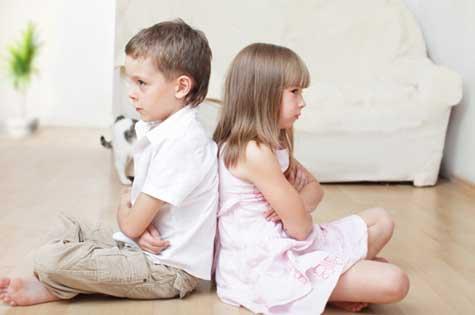When mum or dad mix in, it only appears to cut off the tit-for-tat.
That's why parents are better off staying out of it even when it's difficult.
Children often fight for reasons that adults cannot comprehend - who got the bigger scoop of ice-cream or who gets to sit next to dad.
When the argument gets loud or kids start hitting each other, it's hard to just look on.
But experts say it's better to stay out of it, and when it can't be avoided they should at least keep certain rules as arbitrators in order to bring the fight to an end.
"Fighting itself is actually not a bad thing. It is in fact very important for a child's personality development," said Stefan Carl, a spokesman for a German academy that focuses on violence. They can learn to formulate their needs and desires and to assert themselves. Beyond that they learn that sometimes they win, sometimes they lose and that it's important to be able to reach compromises.
Taking part in conflicts teaches children socialisation skills. A person who didn't learn how to argue properly in childhood will have a harder time later if they are part of a group, said Svenja Luethge, a psychologist in Germany. A lack of experience in arguing can make it problematic for them to integrate or to hold their own.
Part of a real fight involves finding solutions. That's why it's better when parents resist getting involved "at least as long as the fight doesn't degenerate into an argument in which one of the children is verbally abused or physically injured", said Luethge. Parents should get involved only if that is the case, and they should try to remain as calm as possible.
"When parents have an opportunity to effectively mediate and teach the children positive ways to argue, they should take a few things to heart," said Gabi Althoff of a German mediation association.
Simply separating the fighting parties only puts off the argument. It's also important not to take a position and to let both parties speak.
"You should first find out what triggered the conflict," said Luethge. If the children are very worked up, it can take a long time. Once the reason for the fight is found, adults can ask the children for their opinion, for example, how they feel and what they want from the other child.
That's how girls and boys can better understand and recognise why the behaviour of others can get on someone's nerves.
"Beyond that such a conversation provides a launching pad for a solution that satisfies them," said Helge Dietrich of an education organisation in Germany. The best scenario is not to be the mediator, but the person who finds the key to peace. A compromise they identify themselves is easier for them to accept than one imposed on them from the outside.
To help develop their children's arguing skills, parents should tell children to let the other person speak and don't get loud or physical.



















__small.png)










